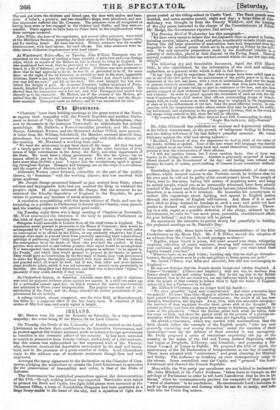Cht Probinces.
" Chartists " have been holding meetings in the great towns of the North, o express their sympathy with the French Republic and petition Parlia- ment in favour of " the Charter." On Wednesday, in Birmingham, they met by thousands in the immense Town-ball; an enthusiastic but orderly assemblage. Mr. Baldwin, a Town-Councillor, presided; and Mr. Joseph Sturge, Alderman Weston, and the Reverend Arthur O'Neil, were present. A letter from Mr. William Scholefield, the Member, excused himself from attendance, but expressed unreserved sympathy with both the objects of the meeting. Mr. Blaxland, a working man, said-
" We want the aristocracy to pay their share of the taxes. All that the head of a family pays to the state is received back by the other branches of it by means of their commissions in the Army, the Navy, and other departments of the State. We must have a cheap government. We love the Queen, but we swot afford to pay her so high. For my part, I think no monarch ought to have more than 50,0001. a year. I rejoice that the revolutionary spirit is spread- ing throughout Europe. Hungary and Germany are on the verge of a revolution, and the sceptre of Austria totters to its fall."
Alderman Weston came forward, ostensibly on the part of the middle classes, to " fraternize " with the working classes; and was received with great applause. Mr. Joseph Sturge presented himself as just arrived from Paris, where soldiers and impregnable forts had not enabled the King to withhold the people's right. M. Arago informed Mr. Sturge, that the moment he as- certained the friendly disposition of England to the Republic, he gave orders to prevent any increase of naval armaments.
A resolution sympathizing with the heroic citizens of Paris, and one de- termining on a petition to Parliament in favour of the Charter, were passed; and the meeting.separated with perfect good order.
On Tuesday uight there was a lane meeting of Chartists at Newcastle. Mr. West announced the intention of the body to petition Parliament on the 10th of April in an imposing form.
Delegates would assemble in London from all the chief towns in England. The deputation would proceed in procession to the House of Commons; they would be accompanied by a " body-guard," prepared to maintain order; they would suffer no interruption to be offered by the Police, or any authority whatever; but if any attempt were made to prevent them from peaceably exercising their constitutional privilege of petitioning, their "body-guard " would resist; and if blood were shed, the consequence be on the beads of those who provoked the conflict. If their petition were attended to and redress granted, their object would be accomplished. If it were rejected, then the deputation would prepare an address " to be signed by the People, and which they would proceed to present to the Queen in person. They would have no intervention by the Secretary of State; they were deter milled to make her Majesty thoroughly acquainted with their- wishes. if he listened and granted relief, all would be well; but if not, then other and more decisive steps would: be taken, which it was not necessary at present more particularly to describe. One thing they had determined, and that was to have their "rights"— peaceably if they could, forcibly if they must.
At Chelmsford Assizes, on Saturday, Adelaide Anne Bell, a girl of eighteen, was tried for perjured evidence given against her master, in a trial two years ago for a pretended assault upon her; on which evidence the master was convicted, and sentenced to fifteen years' transportation. The perjury was made out to the satisfaction of the Jury; and the Judge awarded the lenient punishment of ;im- prisonment for six months.
A railway viaduct, almost completed, over the river Nidd, at Knaresborough, has fallen in; a supposed effect of the late heavy rains. It consisted of four arches of fifty feet span and nearly eighty in height.


























 Previous page
Previous page